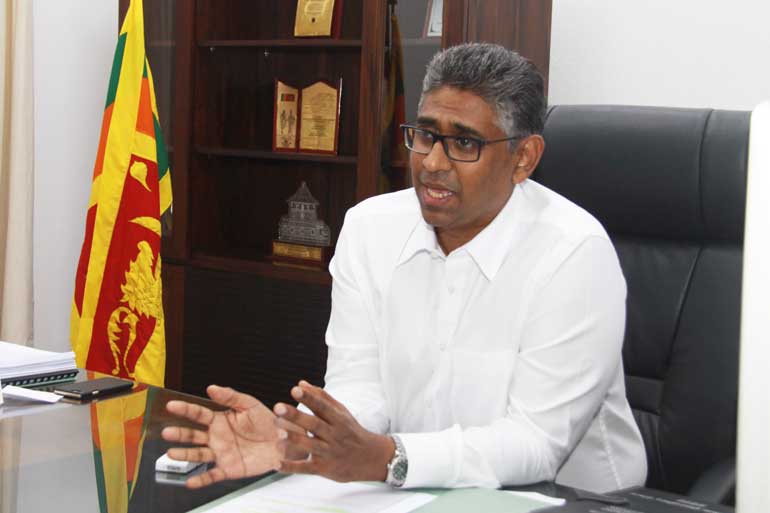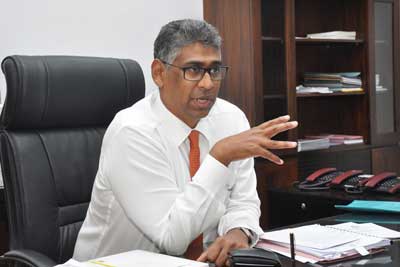Friday Feb 20, 2026
Friday Feb 20, 2026
Saturday, 19 March 2016 00:00 - - {{hitsCtrl.values.hits}}
 By Faiszer Musthapha
By Faiszer Musthapha
When looking back towards the recent election history, it was always fights for votes and political conflicts while it is very rare that consensual, fair and peaceful elections have been taken place.
In each election where the proportional representative system took place, surpassing the conflicts among different political parties, issues raised such as conflicts created among the candidates, contributors in the same political party, pressures to violate election laws, interruptions to implement law, smashing of government and private resources, losing lives as well as interruptions towards voters to vote independently.
According to the recent experiences, it is very clear that especially the elections in Local Government Institutions where a huge number of candidates competing for the same Local Body, this situation had been grown badly. After unanimously resolved the Local Authorities (Amendment) special provisions act No. 21 of 2012 and Local Authorities Elections (Amendment) Act No. 22 of 2012, a new election system was introduced to this country, avoiding the said defects of the proportional representative system and adding effective features of the electoral system that prevailed in Sri Lanka till the 80th decade.
An outstanding feature of this mixed system is that the defeated votes are offered with 30% from the elected candidates for wards under the proportional representative system. It is done in order to avoid the defects of the electoral systems that prevailed till the end of the 70th decade. The addition of the votes of elected candidates for a particular Local Authority area and the votes of the candidates who obtained less than 5% of votes, is deducted from the valid votes for the relevant Local Authority area, the rest number of votes decide the number of representatives elected for that Local Authority under this proportional representative system.
The ratio of votes obtained by the rest candidates is to the votes obtained by the elected candidates is more than 30%, they will be offered with the exact number of seats under the proportional representative system which is 30% . But if that ratio is less than 30%, the seats offered will be decided on the percentage of votes. So, if the candidates, who were defeated, have obtained a high percentage of votes, that particular party or the Independent group will have the chance to confirm the representation under the proportional representative system.
It was scheduled to appoint a National De-limitation Committee by the Minister of Provincial Councils and Local Government in order to appoint a District De-limitation Committee by the district secretary to assist the de-limitation process. The five member de-limitation committee made the recommendations on deciding the number of wards, demarcation of wards, and naming them. Those recommendations are to be presented to the President through the Minister also considering the views received by the district delimitation committees.
The National De-limitation Committee shall make its recommendations for the division of a local authority area into wards, taking into consideration the ratio of the ethnic composition of the local authority and its physical features, the population of the local authority area and the density of such population and the level of economic development of the local authority area.
This process which is used to hold the next Local Authorities Elections under a new hybrid system has concluded by now and to examine public discrepancies towards this, I have appointed a special committee. Provisions have been arranged to nominate one candidate from one party or independent group per ward, under this new system. Therefore there is no need to compete for votes and to spend a huge amount of money on elections unnecessarily.
A recognised political party or an independent team have the power to appoint the mayor and the deputy mayor for a local authority, if the particular political party or the independent group have won more than 50% of the total seats in that local authority. If a particular political party or an independent group is unable to win more than 50% of seats, the provisions have been made to elect the mayor and the deputy mayor by the votes of the members.
 Provisions that have been arranged in the budget of the local government institution can be considered as an outstanding feature of the Act No. 21 of 2012, introduced in the new election system. The unlimited power owned by the mayor or the chairman of the relevant local authority regarding the budget is removed by this. According to the new amendments of the Acts, if the mayor or the chairman appointed after that gets defeated in the budget, the particular local authority is considered to be dissolved and will appoint a special commissioner to held office for the balance period remaining of the term of office of such local authority.
Provisions that have been arranged in the budget of the local government institution can be considered as an outstanding feature of the Act No. 21 of 2012, introduced in the new election system. The unlimited power owned by the mayor or the chairman of the relevant local authority regarding the budget is removed by this. According to the new amendments of the Acts, if the mayor or the chairman appointed after that gets defeated in the budget, the particular local authority is considered to be dissolved and will appoint a special commissioner to held office for the balance period remaining of the term of office of such local authority.
Local governance must not be a state administrative mechanism but a populist government where it confirms the democratic rights of the public and implements the needs of the public. Accordingly, the new election system which was unanimously resolved in the parliament, confirming the current needs, will be the foundation to make a populist local authority system.
(The writer, President’s Counsel, is Minister of Provincial Councils and Local Government.)